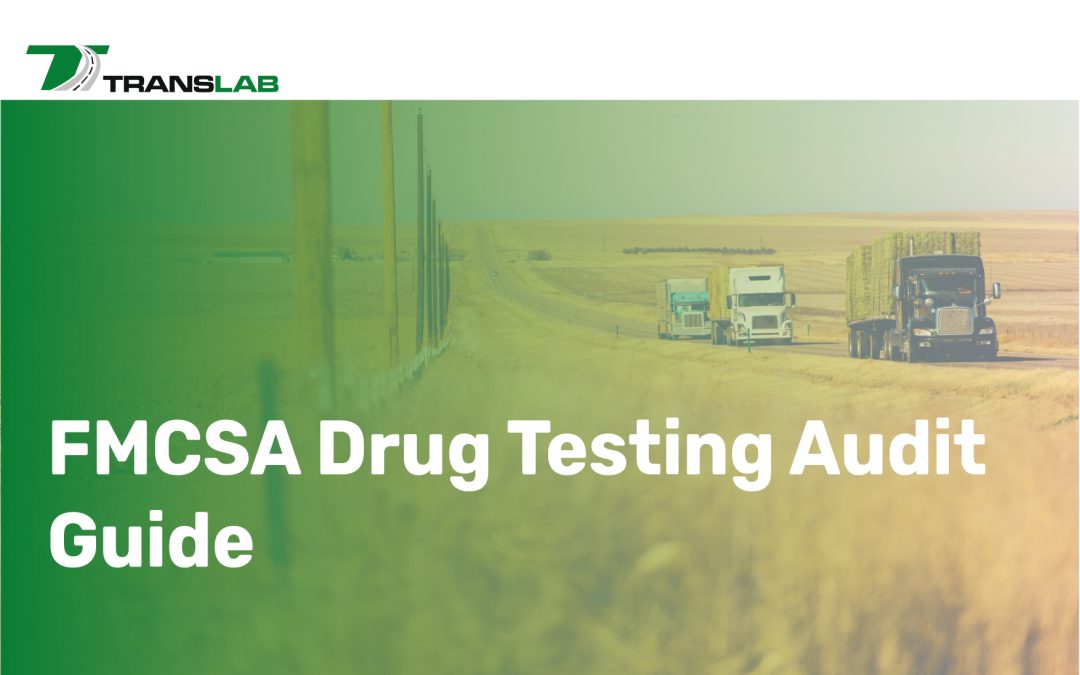The Federal Motor Carrier Safety Administration (FMCSA) enforces strict guidelines to ensure safety on the roads, and one key aspect is their drug and alcohol testing regulations. An FMCSA drug testing audit can occur at any time, and being unprepared can lead to serious consequences, including fines, penalties, and even suspension of your operating authority. To help you stay compliant, here’s what you need to know to successfully navigate an FMCSA drug testing audit.
1. Understand FMCSA Drug Testing Requirements
Before preparing for an audit, it’s crucial to understand the key components of FMCSA’s drug testing regulations. As part of the DOT’s (Department of Transportation) overall compliance efforts, FMCSA requires drug and alcohol testing for all safety-sensitive employees, including:
- Pre-employment testing
- Random testing
- Reasonable suspicion testing
- Post-accident testing
- Return-to-duty testing
- Follow-up testing
Each type of test has specific criteria, and it’s essential that you’re conducting them at the right times and keeping accurate documentation.
2. Maintain a Comprehensive Drug and Alcohol Policy
An up-to-date and compliant drug and alcohol policy is your first line of defense during an FMCSA drug testing audit. This policy should clearly outline:
- Which employees are subject to testing
- Procedures for drug and alcohol testing
- Steps to take if an employee fails a test
- Recordkeeping requirements
Ensure all employees are aware of the policy, and that supervisors are trained to enforce it consistently. Your policy should be easily accessible and align with FMCSA regulations to avoid potential violations.
3. Use the FMCSA Clearinghouse
The FMCSA Clearinghouse is an online database designed to track drug and alcohol violations for CDL (Commercial Driver’s License) holders. As an employer, you must regularly query the FMCSA Clearinghouse to check if potential hires or current employees have committed drug or alcohol violations. There are two types of queries:
- Full Queries: Required before hiring a CDL driver.
- Limited Queries: Required annually for current employees.
You must maintain records of both types of queries as part of your audit documentation. Using the FMCSA Clearinghouse is mandatory, and failure to comply can result in serious penalties.
4. Keep Accurate Records
One of the most critical components of passing an FMCSA drug testing audit is having thorough, well-organized records. The FMCSA requires employers to keep the following documents on hand:
- Drug and alcohol test results
- Driver consent forms for testing
- Documentation of any drug or alcohol violations
- Proof of random drug testing program participation
- FMCSA Clearinghouse query records
- Supervisor training records for recognizing drug and alcohol abuse
These records must be kept for a minimum of five years. Make sure your files are complete, accurate, and easily accessible when an auditor requests them.
5. Maintain a Random Drug Testing Program
The FMCSA requires that employers implement a random drug and alcohol testing program. At least 50% of your employees must be tested for drugs, and 10% for alcohol annually. Your testing program should be unpredictable and run throughout the year, ensuring no employee can anticipate when they’ll be tested.
A third-party administrator can help you manage this program, ensuring you remain compliant with FMCSA drug testing regulations. Make sure to document all random testing events to provide proof during an audit.
6. Train Supervisors for Reasonable Suspicion Testing
FMCSA requires supervisors to be trained in identifying signs of drug and alcohol abuse. This is particularly important for reasonable suspicion testing, which is triggered when a supervisor believes an employee may be under the influence while on the job.
Ensure your supervisors complete this training and that you have proper documentation of their completion. This will demonstrate your company’s proactive approach to compliance during an audit.
7. Review and Update Your Compliance Procedures Regularly
Regulations can change, and FMCSA drug testing policies are no exception. Regularly review your drug and alcohol policy, testing procedures, and recordkeeping practices to ensure they align with the latest FMCSA guidelines. Staying informed about regulatory updates will help you avoid costly mistakes that could lead to non-compliance.
8. Be Prepared for an Onsite Audit
During an FMCSA drug testing audit, auditors may visit your location to review your records and processes. Be ready for an onsite inspection by having a well-organized system in place for storing records, communicating your drug and alcohol policy to employees, and demonstrating compliance with the FMCSA Clearinghouse.
A mock audit can help identify any weaknesses in your procedures before the actual audit occurs. Consider hiring a consultant or conducting an internal review to spot potential compliance gaps.
Preparation is key when it comes to an FMCSA drug testing audit. Understanding FMCSA drug testing requirements, maintaining accurate records, and utilizing the FMCSA Clearinghouse are critical steps toward staying compliant. By keeping your policies up to date and training your staff appropriately, you can ensure your company is ready for any audit. Taking a proactive approach will not only help you pass the audit but also contribute to a safer workforce and a more secure transportation industry.


